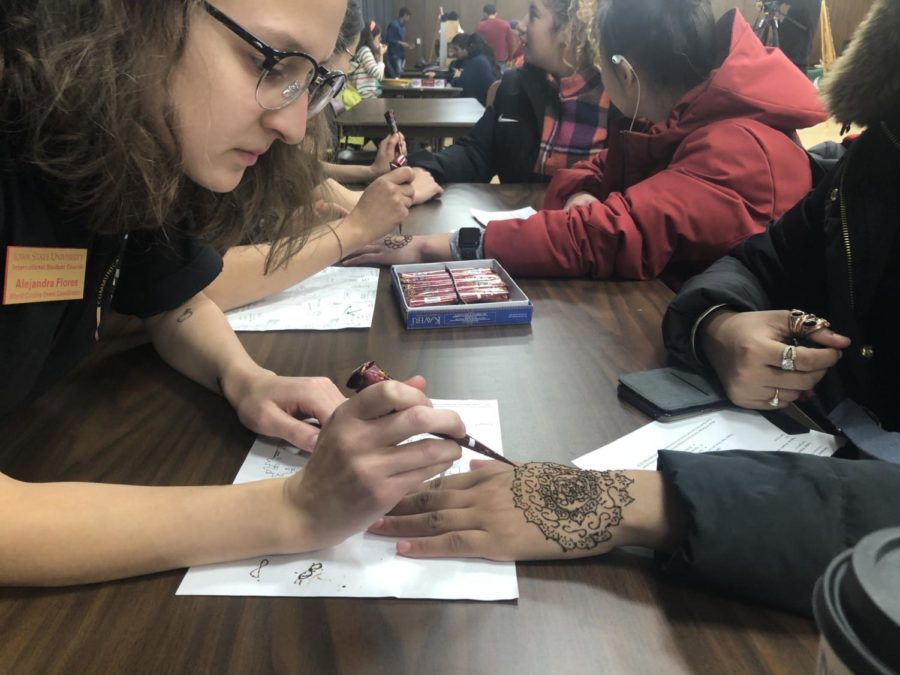International Week event represents cultures through games
Logan Metzger/ Iowa State Daily
Alejandra Flores, sophomore in political science and history, applies henna to an attendee’s hand at the “Bazaar and Game Night” event Monday.
November 11, 2019
The International Student Council (ISC) hosted one of the events of International Week Monday in the Sun Room of the Memorial Union.
The event, a bazaar game night, had many different countries represented through popular games and historical events to represent important pieces in their culture.
Various student organizations representing different countries brought activities and information to the game night event.
Six total organizations participated in this event: the Vietnamese International Student Association, the Iranian Student and Scholars Association, the Arab Student Association, the Hindu Yuva, the Japan Association and the Pakistan Student Association.
The Vietnamese International Student Association brought the most popular card game of Vietnam and a board to provide information on the war between Vietnam and China that occurred around the year 900.
The card game, called Tien Len, or “Go Forward,” is a game that everyone often plays in Vietnam. Caroline Nguyen, a junior in chemistry, one of the workers representing the organization, recalls playing the game in elementary school.
There are typically four players who play with a standard 52 card deck. Two is the highest card and it goes in descending order with the lowest card being three. Suits are ordered similarly, with hearts being the highest, then diamonds, clubs and spades being the lowest. However, suit is not as important as the numeral.
The point of the game is to begin with the lowest card and the subsequent players each try to beat each other with cards of a higher number. If they cannot beat the previous player, they must pass their turn. This continues until a player lays down cards that no one can top. The winner then may start the game anew.
The Pakistan Student Association presented their culture by bringing a history board and displaying traditional clothing from Pakistan.
One of their representatives, Qamar Farooq, a graduate student in chemistry, also wrote people’s names out for them in their native language, Urdu.
Next was the Japanese Association. Their display boasted a poster about Japan’s most popular anime and video game franchises, along with a poll about participants’ favorite animes and three activities.
The activities included a game called kamizumo, kendama and origami.
Kamizumo, or paper sumo, is a game where players tap on the edge of a wooden game board and try to knock their opponents paper wrestler down or out of the ring.
Kendama consists of a handle with three cups, two on each side and one on the end, a spike on the other end and a ball connected by a string. This game improves coordination and reflex.
William Clemmons, one of the workers for the Japanese Association, commented on how expressive these games were though they are primarily for children and how creative someone can get due to the simplicity of the games.
The final activity the Japanese Association had was origami. This art of paper folding is done by manipulating a single sheet of paper to create various pieces, whether they are simple or complex.
The Arab Student Association gave students Henna tattoos as a representation of their culture. Henna, a form of temporary body art, is typically used for weddings and other types of celebrations, according to Joyee Leong, a junior in chemical engineering and a member of the ISC.
Hindu Yuva is an organization that promotes the culture of India that was designed to reach out to everyone who was interested in being involved.
They brought with them a game called kanche. Kanche, a popular game in the 90s, is a game that uses marbles. Players place their marbles in a circle and try to hit others marbles out.
Ashish Gorthy, a graduate student in computer science, commented on not only the games, but the community of Iowa State. He said it reminds him of India, where there are lots of different cultures present, with all the diversity within the university.
This event was the second of three events during International Week at Iowa State.

















